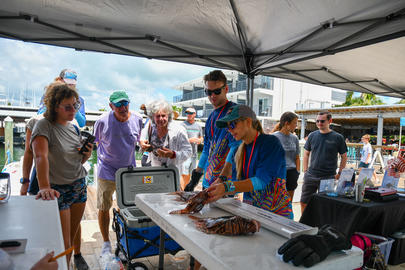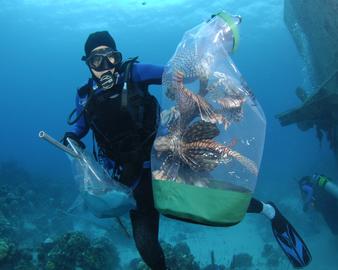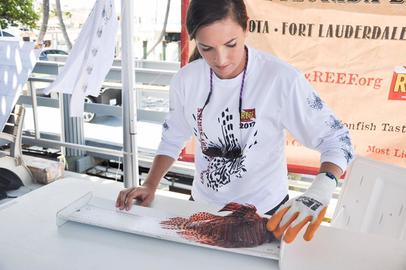We're gearing up for summer, and that means Lionfish Derby season is here! We're excited to share that registration is now open for the 2023 REEF Florida Keys Lionfish Derby & Festival on Sept. 7-10. The event includes two full days of lionfish hunting, followed by a lionfish festival at Postcard Inn Beach Resort & Marina in Islamorada, Florida. The family-friendly festival takes place on Sunday, Sept. 10 and includes lionfish scoring, tastings, educational demos, games, crafts, raffles, and activity booths from arts and conservation vendors.
Current search
Search found 426 items
- INVASIVE
On December 14th, 2014, REEF staff and volunteers recorded the third successful pre-emptive removal of a non-native fish in south Florida coastal waters when they removed a mimic lemon peel surgeonfish (Acanthurus pyroferus) from waters under the Blue Heron Bridge in Palm Beach County.
South Water Caye Marine Reserve, in southern Belize, is a unique mangrove/coral reef habitat and home to several endemic species including the Social Wrasse and the Maya Hamlet. The goal of this trip is to study the effects of stressors such as invasive lionfish and habitat loss on this remote area of the Mesoamerican barrier reef system, with a special focus on how these impacts are affecting species that are not found anywhere else in the Caribbean. Participants will work with local partners to conduct fish surveys as well as lionfish research and removals.
Caroly’s Notes
In 2017, REEF is offering an Invasive Lionfish Research Trip, once again in partnership with the fabulous Go West Diving and Kura Hulanda Lodge. |
It’s not too late to join REEF on one of our fantastic Field Survey Trips this year! We have a couple openings left on some upcoming trips this fall and winter. Join us and become part of one of the world’s largest ocean citizen science efforts, featuring an itinerary of diving, seminars and fun.
REEF staff co-authored a new publication in the scientific journal PeerJ that features research findings from our Invasive Lionfish Research Program. The paper, titled "Setting the record straight on invasive lionfish control: Culling works", evaluates the effectiveness of lionfish removal efforts. Frequent culling of the invasive Indo-Pacific Lionfish throughout the Caribbean has been shown to cause a shift towards more wary and reclusive behavior by lionfish, which has prompted calls for halting culls.
We are excited to share the latest publication stemming from REEF's Invasive Lionfish Research Program - "Mobilizing volunteers to sustain local suppression of a global marine invasion," recently published in the scientific journal Conservation Letters.
This summer, divers and snorkelers from around the country came together to combat the invasive lionfish, vying for over $14,000 in total cash prizes. The series included derby events throughout Florida including Sarasota, the Upper Keys, Fort Lauderdale, and Palm Beach County, as well as Lionfish Culinary Competitions in conjunction with the Sarasota and Palm Beach County derbies.
Predicting and mitigating the effects of invasive Indo-Pacific lionfish Pterois volitans on Caribbean fish communities requires a thorough understanding of the species’ predation behaviour in the invaded range, including the types and amounts of prey consumed and how foraging patterns vary in relation to extrinsic conditions. We studied the activity levels and prey consumption rates of lionfish on 12 shallow coral reefs in the Bahamas in relation to time of day and prey availability.






